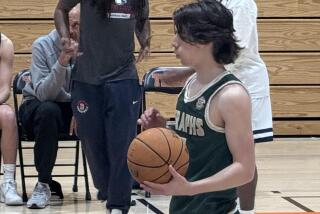Coach’s move was well worth the price
- Share via
There’s this coach.
He plies his trade in the shadow of downtown L.A. He’s got a different kind of philosophy, he’s a different kind of cat.
Yes, he gets results, big time. But it’s more than that. He says playing basketball is about honoring the game, about calmness amid storms, about being a stand-up human being and treating your teammates like you are all one and the same.
Phil Jackson?
Not quite.
Still, in important ways, Phil Jackson doesn’t have much on Jamal Adams, the big, burly, kindhearted-yet-competitive coach at Loyola High.
Adams’ team scored a huge win on Friday night, advancing to the CIF Southern Section Division II-A final next Saturday.
But Adams himself is a finalist for a nationwide award that will be bestowed this spring to a small group of youth coaches who exemplify what is best about their calling. It’s called the Double-Goal Award, it’s bestowed by the nonprofit Positive Coaching Alliance, and it’s meant to honor those who emphasize building character and class as much as they do coming out on top.
We live in an age when seventh-grade shooting guards are fawned about on national TV. An age when parents froth on the Internet, brawl in the stands, and ungrateful college coaches throw hissy-fits when pressed on the millions they make while one in 10 of us can’t find work.
In times like these, it’s good to know that coaches like Jamal Adams exist. And that they prosper. It’s good to know a story like his.
::
Adams starred on the basketball court at Loyola High in the late ‘80s. He was captain, league MVP, and much more. “A leader from the moment he walked on this campus,” said his coach from back then, Bill Thomason. “When he graduated, he was given the honor of salutatorian, the guy who speaks on behalf of the class at graduation, the guy who all of the other students say have their hearts.”
Nothing changed at Columbia, where Adams excelled in the classroom and again in basketball. He was a great athlete but a screwball shooter and when he graduated, knowing his playing days were done, he headed for Wall Street.
Once again, he thrived, earning a fat, six-figure salary, ending up back in Los Angeles, on course to be a titan. But here, waking in the pre-dawn each day for the market’s opening bell, chasing money like a mouse chasing ever distant slices of cheddar, he grew unfulfilled and unhappy. So unhappy that he took a second job as a Loyola assistant coach.
Suddenly, surprisingly, the head coaching job opened. Adams found himself at a crossroads. If he got the job, he’d become not just a coach, but a teacher at Loyola, drawing slim teacher’s pay. “A tough, tough decision,” Adams recalls. “But I had some good advice.”
Jamal Adams, you see, had a younger brother, Kenan, who’d followed Jamal’s footsteps through much of his life. They were a few years apart in age, yet as close emotionally as identical twins. Growing up, even when they didn’t have to, they’d always shared the same room.
But by 2005, when Adams was making his decision, Kenan had grown ill, and gravely so. It was brain cancer.
“Jamal,” younger brother said to older one, “you’ve gotta follow your heart. We don’t know how long we are going to live. None of us do. I say it’s easy: Coaching Loyola is what you are supposed to do.”
And so it was that Adams applied for the job, got it, left Wall Street, grew immensely on the happiness scale, and began coaching the way he wanted to be coached. He emphasized the patience, perseverance and strength he witnessed from his sick brother, and the lessons he’d learned from reading about Phil Jackson and John Wooden. He treated his players with respect and encouragement and demanded they treat others the same way. Most of all, he made sure that Loyola basketball is about family, not individual acclaim.
There was a fine first season and a hard second one. Kenan hung around the team as much as he could, but he also grew sicker. Then, as last season began, not long after a terrible seizure, he died. He was 31.
When Adams, now 36, eulogized his brother, he looked out at the front rows. Seeing his entire team there he realized something. Indeed, these kids had become as close to him as his own wife and small children.
“We all wanted to be there for Coach,” said one of those players, Jordan Gathers. “We needed to show him we cared.”
Gathers, 17, a junior with a sweet shooting touch, is one of several Cubs players who come from a single-parent home and now regard Adams as a father figure. You talk to him about Adams and hear an echo of what they all seem to say, kid after kid, each noting something special their coach has done in their lives that goes far beyond basketball. There’s the forward who had an inner-ear surgery and thought he’d never play again. Adams gently coaxed him back. There’s the player whose mother is waging her own fight against cancer. Adams has helped coax her too.
“I struggled when I came to this school,” Gathers said. “Not with basketball, but with school. Coach was the difference. That’s why it meant so much to be at the funeral.”
Loyola has been on a tear ever since. This year, the Cubs have lost only five games.
On Friday, they beat a tough La Mirada team, 80-60. Watching Adams was almost as entertaining as the game itself. He was always on his feet, excited, emotional, upbeat. Not once, not even when his team was struggling, did I see him lay wrath on his players.
When they made a mistake, he’d pull them aside and pat them on the back and encourage. “I know you can do better than that, you know it too. Now go out and play defense like you’re the best defenders in all of Los Angeles!”
This was the polar opposite of the foul-mouthed, constantly threatening, sourpuss progeny of Bob Knight.
Jamal Adams proves there’s another way. His team shows it works. They play like brothers.
--
More to Read
Get our high school sports newsletter
Prep Rally is devoted to the SoCal high school sports experience, bringing you scores, stories and a behind-the-scenes look at what makes prep sports so popular.
You may occasionally receive promotional content from the Los Angeles Times.







